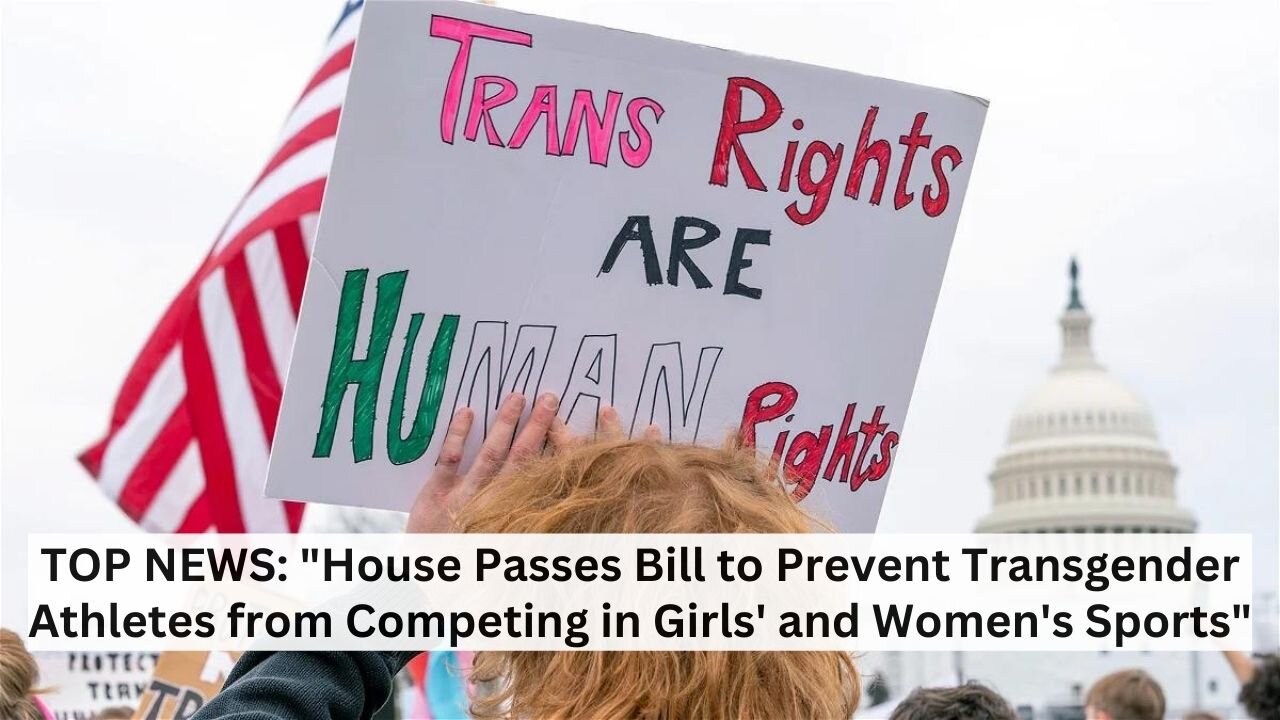Premium Only Content

TOP NEWS: "House Passes Bill to Prevent Transgender Athletes and Women's Sports"
The House of Representatives passed a bill on Thursday aimed at preventing biological males from competing as transgender athletes in girls' and women's sports at schools across the country. The Protection of Women and Girls in Sports Act passed in a 219-203 vote, with all "yes" votes coming from Republicans and all "no" votes coming from Democrats.
Republicans defended the bill as a means of sparing women and girls from having to compete against transgender women and girls who are biological males and can dominate these sports, preventing some female athletes from making the team. However, several Democrats accused Republicans of bullying transgender students by calling up the bill.
Representative Greg Landsman of Ohio argued that "This bill is about bullying children. Stop bullying children." Representative Robert Garcia of California claimed that "House Republicans are choosing to bully and belittle trans children" and that "This is about attacking a small group of children, and it is shameful."
Representative Pramila Jayapal of Washington suggested renaming the bill the "cancel kids trans hate" bill, saying that "This bill fuels a virulent hate campaign against kids who just want to play with their friends." Representative Mark Takano of California argued that the bill would make school sports "less safe for women and girls" and that even discussing the legislation on the House floor was doing harm to transgender students.
Republicans rejected these arguments and said they are trying to protect girls' and women's sports from being taken over by biological males. Representative Virginia Foxx of North Carolina said Democrats are ignoring the "physical advantages" that men have over women and rejected Jayapal's argument that the GOP is waging a "hate" campaign against transgender students. "It is ridiculous that we have had to stand here today to defend the rights of women and girls to participate in sports against other women and girls and they not being taken advantage of by biological males,". The Protection of Women and Girls in Sports Act sponsored by Representative Greg Steube of Florida, states that educational institutions that receive Title IX funding from the federal government would not be allowed to "permit a person whose sex is male to participate in an athletic program or activity that is designed for women or girls." The bill adds that the sex of an athlete is defined only by their "reproductive biology and genetics at birth."
Representative Bob Good of Virginia noted the case of Lia Thomas, a biological male who competed against women and won an NCAA swimming title last year. Good said, "Lia Thomas, whose given name at birth is William Thomas, ranks 65th among men in the 500-yard men's freestyle; however, he could beat all the biological women. A female student athlete at nearby Virginia Tech lost her opportunity to compete in the finals because a man took her place."
NCAA champion swimmer Riley Gaines, who competed against Thomas and is now an activist looking to defend women's sports from trans athletes, said she supported Steube's bill when he introduced it. Gaines wrote, "As an athlete who has experienced the injustice of competing against a male firsthand, I'm grateful for the leadership of Representative Steube. He has made it clear that he will fight for fairness, privacy, and safety for girls and women in sports." Subscribe for more content like this.
Steube has said he introduced his bill in order to "save women’s sports" from transgender women and girls who are denying biological women and girls spots on the team's roster and sometimes dominate these sports. He said a dangerous shift in U.S. culture requires a defense from Congress.
The Protection of Women and Girls in Sports Act has now passed the House of Representatives, but it is unclear if it will make it through the Senate. The debate surrounding this issue has become highly politicized, with each side accusing the other of bullying and discrimination.
The debate over transgender athletes in girls’ and women’s sports has been a hot topic of discussion in recent years, with opinions on both sides of the issue. On Thursday, the U.S. House of Representatives passed the Protection of Women and Girls in Sports Act, aimed at preventing biological males from competing as transgender athletes in girls’ and women’s sports at schools across the country. The bill passed in a 219-203 vote, with all the "yes" votes coming from Republicans, and all the "no" votes from Democrats.
The Republican lawmakers behind the bill have defended it as a necessary step to ensure that girls and women are not forced to compete against transgender athletes, who they argue, have inherent physical advantages due to their male biology. The bill is seen as a response to the growing number of transgender women and girls who are competing in women’s sports, sparking controversy and debate across the country.
However, several Democratic lawmakers have accused Republicans of "bullying" transgender students and argued that the bill is an extension of the bullying that transgender students already face at school. "This bill is about bullying children," said Rep. Greg Landsman, D-Ohio. "Stop bullying children."
Other Democratic lawmakers echoed Landsman’s sentiments, stating that the bill is an attack on transgender children and that it would make school sports "less safe for women and girls." Rep. Mark Takano, D-Calif., even went so far as to argue that even discussing the legislation on the House floor was doing harm to transgender students. "This debate itself has been traumatizing," he asserted.
The debate over transgender athletes in girls’ and women’s sports is not a new one, with similar bills being introduced and passed in several states across the country. Advocates of these bills argue that allowing transgender women and girls to compete in women’s sports gives them an unfair advantage due to their male biology.
However, opponents of the bills argue that such laws are discriminatory and violate the rights of transgender athletes. They point out that transgender women and girls have undergone hormonal treatments to suppress their testosterone levels, making it more difficult for them to maintain their physical advantage. They also argue that preventing transgender athletes from competing in their chosen gender is harmful to their mental health and well-being.
The issue has become particularly contentious in the world of college sports, with several high-profile cases of transgender athletes competing in women’s sports and winning championships. For example, Lia Thomas, a transgender woman who competed in women's swimming at the NCAA level, won a championship last year, sparking controversy and debate among athletes, coaches, and fans alike.
Despite the opposition from Democratic lawmakers, the Protection of Women and Girls in Sports Act is now heading to the Senate for consideration. It remains to be seen whether it will gain enough support to become law, but one thing is clear: the debate over transgender athletes in girls’ and women’s sports is far from over, and it will continue to be a contentious issue for years to come. Thanks for watching, subscribe our channel for authenticity.
-
 0:50
0:50
Sean Unpaved
8 hours ago $0.02 earnedWelcome “Unpaved w/ Sean Salisbury” to Rumble
522 -
 LIVE
LIVE
FreshandFit
2 hours agoFresh&Fit Meets Access Vegas!
4,002 watching -
 25:53
25:53
Stephen Gardner
4 hours ago🔥BREAKING: Trump HATING LAWYER busted in $17 million money laundering scheme!
8.82K59 -
 20:10
20:10
CartierFamily
11 hours agoAndrew Schulz DESTROYS Charlamagne’s WOKE Meltdown on DOGE & Elon Musk!
87.7K84 -
 33:56
33:56
The Why Files
9 days agoLegend of the 13 Crystal Skulls | From Mars to the Maya
40.6K37 -
 2:56:14
2:56:14
TimcastIRL
5 hours agoEPSTEIN Files DROP, FBI GOES ROGUE, AG Says They COVERED UP Epstein Case w/Amber Duke | Timcast IRL
152K69 -
 1:39:23
1:39:23
Kim Iversen
5 hours ago"Canada's Trump" Is Trudeau’s Worst Nightmare: Is Maxime Bernier the Future of Canada?
54.2K60 -
 DVR
DVR
Bannons War Room
10 days agoWarRoom Live
2.65M446 -
 16:06
16:06
The Rubin Report
12 hours agoProof the Islamist Threat in England Can No Longer Be Ignored | Winston Marshall
72.6K73 -
 2:07:07
2:07:07
Robert Gouveia
9 hours agoFBI Files Coverup! Bondi FURIOUS; SCOTUS Stops Judge; Special Counsel; FBI Does
94.7K79